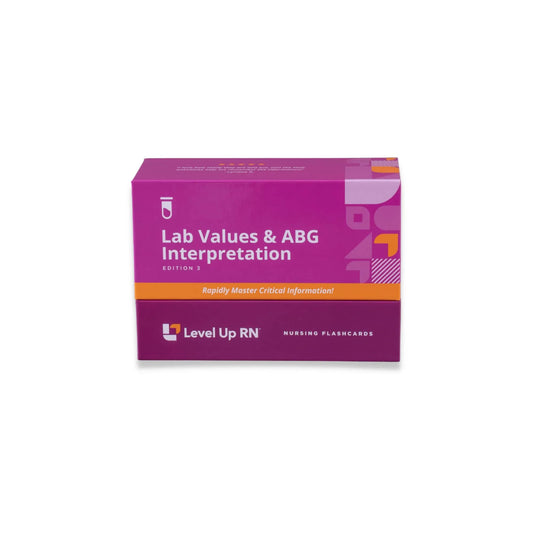Lab Values, part 9: Creatine Kinase MB (CK-MB)
The lab value creatine kinase MB (CK-MB), its function in the body, the expected range, and what to know when caring for a patient with an elevated CK-MB level.
Quiz Questions
The nurse educates a patient that his CK-MB levels will be elevated for what amount of time following cardiac muscle damage?
The nurse educates a patient that his CK-MB levels will be elevated for what amount of time following cardiac muscle damage?
Full Transcript: Lab Values, part 9: Creatine Kinase MB (CK-MB)
Full Transcript: Lab Values, part 9: Creatine Kinase MB (CK-MB)
Hi, I'm Meris, and in this video, I'm going to be talking to you about the lab value creatine kinase MB or CK-MB, what it is and what it means when it's elevated, along with important patient teaching. All right, let's go ahead and get started.
So first off, let's talk about what CK-MB is. Creatine kinase MB is an isoenzyme, or it's a type of an enzyme that is found in the cardiac muscle tissue. Now, you may be familiar with CK just as its own lab, and we'll talk about that separately. CK is just, again, it's an enzyme that is related to skeletal muscle tissue breakdown. So when there's the presence of creatine kinase, it tells us that there's some kind of muscle injury going on. This particular type of CK, CK-MB, tells us when there has been damage to the cardiac muscle. So this specific test is very useful because it helps us to distinguish the difference between cardiac muscle damage and skeletal muscle damage, maybe related to pulling a hamstring or something along those lines.
Now, what I do want to tell you, for those of you in clinical practice, this is not a lab value that I'm saying we never run, but most commonly, for those of you who work in a setting where we might be needing to rule out different types of myocardial damage, you're more likely to see different varieties of troponin lab values being drawn and investigated versus CK-MB. But they are both important and they both speak to cardiac muscle damage. So let's get into CK-MB a little bit more.
Now, what is the expected range for CK-MB? And really think about this. I want to see if you can kind of think this through on your own. How much cardiac muscle damage do I expect there to be? None, right? In an average patient, the expected value for CK-MB is that it should be 0% of your total creatine kinase. So again, this is a lab value that's often put in proportion with creatine kinase. So it may be read to you as a percentage. What percentage of CK is made up of CK-MB? So again, I don't want my patient to be having any cardiac muscle damage, and I don't expect them to in an average person. So the expected range is 0%.
All right, so what does it mean if my CK-MB level is greater than 0%? Well, that means that I'm experiencing some sort of heart damage related to ischemia. So here we're having some kind of issue with the heart. This is not diagnostic. It's not telling us where the issue is, what the specific cause is. But what we do know is that we are having some form of an issue that is leading to decreased blood flow to the myocardium, to the heart muscle itself. And that heart muscle has become damaged. And that gives me concern as a nurse, right? That's something where I should say, "Oh, hey, we really need to be looking into this." This might be a lab value that I'm calling the doc as soon as I see that it pops up and it's positive, it's elevated. "Hey, doc, we really need to get a look at this," right?
Now, if it is elevated, I need to know when the pain started and when this ischemia began, because that's going to give me some valuable information about how long the CK-MB values should be expected to be elevated. So they will begin to rise as soon as heart damage occurs. As soon as that heart is being damaged, CK-MB is going to start being released into the blood. But it takes about 3 to 6 hours for it to be detected in my patient's blood. So if I have that 10 out of 10 crushing substernal chest pain that just started 20 minutes ago, it's important to remember that a negative, a 0% CK-MB does not mean that there's no heart muscle damage going on because it hasn't been long enough.
Now, these values peak at around 18 hours from the onset of the ischemia, and it takes about 2 to 3 days - that's how long they're going to be elevated, 2 to 3 days - before they're going to start coming down. So this, again, is an important thing for me to know as the nurse. How long do I expect this lab value to be elevated? And do I expect to see it rise, as in has it reached its peak yet or not? And then how long do I need to educate my patient that this lab value may continue to be abnormal so that they are on the same page as me, so that they are an active member of their care team as well?
All right. I'm so glad you stayed until the end because I'm going to test your knowledge of some key facts provided in this video using some quiz questions.
The nurse educates a patient that his CK-MB levels will be elevated for what amount of time following cardiac muscle damage?
2 to 3 days.
All right, that is it for this video. I hope you learned something. All right, I'll see you in the next one. Thanks so much, and happy studying.


